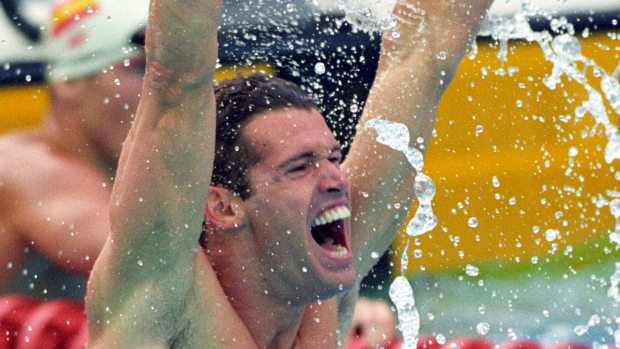Apr 23, 2015
Former athletes speak to challenges, triumphs of LGBTQ inclusion
When Canadian swimmer Mark Tewksbury won gold at the 1992 Barcelona Olympics, there were no gay characters on TV and talking about his sexuality was considered taboo. Flash forward nearly 25 years and the landscape has seen a major shift as an increasing number of lesbian, gay, bisexual, transgender and queer athletes have come out publicly.
The Canadian Press

TORONTO - When Canadian swimmer Mark Tewksbury won gold at the 1992 Barcelona Olympics, there were no gay characters on TV and talking about his sexuality was considered taboo.
Flash forward nearly 25 years and the landscape has seen a major shift as an increasing number of lesbian, gay, bisexual, transgender and queer athletes have come out publicly.
Tewksbury is buoyed by the moves made to support LGBTQ athletes — particularly within the upper echelons of sport. He pointed to changes in the charters of both the Canadian and International Olympic Committees to include sexual orientation in non-discrimination policies as one of several signs of progress.
"Sexual orientation has not been a topic that's really been discussed thoroughly in the world of sports. It's been a long overdue discussion," Tewksbury said in an interview Thursday during a COC roundtable on LGBTQ inclusion in sports.
"(It) helps build awareness, helps people be visible, represented, and really helps move the whole sports system forward."
Last December, the Canadian Olympic Committee announced a partnership with leading LGBTQ organizations aimed at protecting and supporting athletes, youth and coaches in sport and schools, part of a plan to encourage a broader conversation around gay rights issues.
During a morning panel Thursday, U.S. diving great Greg Louganis was lauded for his accomplishments in and out of the pool. But the four-time Olympic champion said he didn't have a role model.
"I always challenge young people... find the hero in yourself," Louganis said in an interview. "We are our own heroes. That is kind of something that I've tried to live by."
Louganis said he never thought he'd see the day where an athlete on a team sport would publicly come out and has been encouraged by the progress made. But he's also witnessed the challenges LGBTQ athletes still face.
He spoke of his experience at the Russian Open Games in Moscow last year following the Sochi Olympics at a time when the country's anti-gay laws were the focus of widespread international attention.
Louganis said the Open Games faced bomb threats, and when authorities learned of a LGBTQ panel discussion at one venue, they were warned they'd be shut down.
Despite the hardships, Louganis said he felt honoured to be on the ground to show solidarity with the LGBT sports federation.
"By supporting them, it allows young people to see that kind of support so they don't feel that alone and isolated when they're being chastised and judged by their own governments," he said.
Wade Davis came out publicly in 2012 — eight years after leaving the NFL. He played with Tennessee, Seattle and Washington during his pro stint from 2000 to 2004.
"I think the biggest fear that I had was that no one who was in my circle of close friends — whether it be high school, college or football — would look at me the same way, that they would absolutely think that I was different, that I was less than," recalled Davis, executive director of the You Can Play Project, an advocacy group working for equality for LGBT athletes in sports.
"Most of my teammates said: 'What did I do to make you think that I wouldn't love you?' And I really learned that a lot of the fears that I had (were) really going on in my own head. And when I finally invited the world in, my life has just gotten so much better."
Follow @lauren_larose on Twitter.
